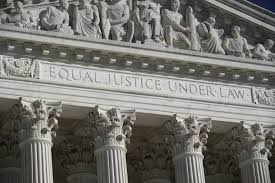The least dangerous branch of the American government is the most extraordinarily powerful court of law the world has ever known. The power which distinguishes the Supreme Court of the United States is that of constitutional review of actions of the other branches of government, federal and state. Curiously enough, this power of judicial review, as it is called, does not derive from any explicit constitutional command. The authority to determine the meaning and application of a written constitution is nowhere defined or even mentioned in the document itself.
Exercising that power the Supreme Court's conservative super-majority has in recent months reverse the fifty year old implication of a private `substantive due process' right to terminate a pregnancy before viability, obstructed the Occupational Safety and Health Administration from protecting workers from the new pathogen by compelling large employers to vaccinate or frequently test for the pathogen, voided a Department of Health and Human Services eviction moratorium designed to prevent homelessness during the height of the pandemic; and, under the guise of leaving law-making to lawmakers, before a policy is even in place, in West Virginia v EPA blocked the EPA from compelling power plants to help move us to solar power.
Much of this was carried out in the name to the recently minted Major Questions Doctrine which, posing as a rule of construction, is actually a substantive limitation on the power of the Congress to legislate. The danger that Bickel feared was that of Brown v. Board of Education - voiding state laws mandating racial discrimination in public education. But rather than restraint, today's conservatives sweep widely. Sometime the sin is excessive legislative generality (DHHS/Surgeon General, OSHA] other time it is the expansive interpretation of a power grant as in its transformation of the Second Amendment from an antique to powerhouse sweeping under century old limitations on New York's limitations on who may have a permit for a handgun.
Like Georgetown's Josh Chafetz who warned of "judicial aggrandizement" Berkeley IP professor Mark Lemley has seen enough to warn of the Imperial Court.
- GWC
Mark A. Lemley
Date Written: July 28, 2022
Abstract
The past two years have marked the emergence of the imperial Supreme Court. Armed with a new, nearly bulletproof majority, conservative justices on the Court embarked on a radical restructuring of American law across a range of fields and disciplines. Unlike previous shifts in the Court, this one isn’t marked by debates over federal versus state power, or Congressional versus judicial power, or judicial activism versus restraint. Nor is it marked by the triumph of one form of constitutional interpretation over another. On each of those axes, the Court’s recent opinions point in radically different directions. The Court has taken significant, simultaneous steps to restrict the power of Congress, the administrative state, the states, and the lower federal courts. And it has done so using a variety of (often contradictory) interpretative methodologies. The common denominator across multiple opinions in the last two years is that they concentrate power in one place: the Supreme Court.
My goal in this essay is not to criticize these decisions on the merits, though there is much to criticize; lots of others will do that. Nor do I aim simply to make the legal realist point that the Justices will do what they want in the cases before them, though the last few terms provide ample evidence for that claim too. Rather, my argument is that the Court has begun to implement the policy preferences of its conservative majority in a new and troubling way: by simultaneously stripping power from every political entity except the Supreme Court itself. The Court of late gets its way not by giving power to an entity whose political predilections are aligned with the Justices’ own, but by undercutting the ability of any entity to do something the Justices don’t like. We are in the era of the imperial Supreme Court.

No comments:
Post a Comment